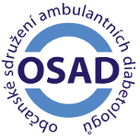National Diabetes Program
National diabetes programme 2012-2022
(28th June, 2012)
Basic theses
1. Introduction
Diabetes mellitus is a heterogeneous group of diseases characterized by hyperglycaemia (high level of blood sugar). About 5-10% of all patients are affected by type 1 diabetes mellitus which is characterized by loss of ability to produce insulin. Therefore, these patients are dependent on insulin treatment. Approximately 90-95% of patients are affected by type 2 diabetes mellitus. It is a typical civilization disease which is developed in individuals with genetic predisposition. The obesity, lack of physical activity and stress are the main risk factors responsible for increasing prevalence of this disease. In a small number of the patients, diabetes mellitus arises from genetically determined dysfunction of beta-cell (MODY and most cases of neonatal diabetes).
Diabetes mellitus is a chronic disease which is not curable yet. If undiagnosed, untreated or poorly controlled, diabetes can cause devastating acute and especially chronic complication worsening the quality of life and increase mortality significantly. The most serious complications include visual impairment and blindness, kidney failure, heart attack, sudden death, stroke, lower limb amputation and erectile dysfunction.
The purpose of diabetes treatment is to prevent complications or to slow down the complications in case they arose. The aim of the diabetes treatment is life extension of the patients while maintaining the quality of life.
2. Epidemiology of diabetes mellitus and its complications
The number of diabetes patients is at crisis levels and escalating worldwide. Therefore diabetes mellitus is considered to be a global epidemic. The similar poor statistics applies for the Czech Republic. On 31 December 2010, over 806 00 diabetes patients have been registered in CZ. Because of lack of clinical symptoms, there is a competent estimation, that approx. 250 000 additional patients with type 2 diabetes are still undiagnosed. In average, diabetes has been newly diagnosed in 55 000 persons and in average 22 0000 persons die from diabetes each year. 40% of patients with chronic kidney disease on dialysis are diabetics.
Development of atherosclerosis is also closely related to diabetes. Patients with high level of blood sugar are represented in the group of patients with proven atherosclerosis up to 70%. And vice versa, approximately ¾ of patients with diabetes die from cardiovascular complications whose incidence is closely related to hyperglycaemia and other risk factors (dyslipidaemia, hypertension) which are typical for diabetes. Details are described in Annex 1.
Latest scientific findings clearly show that it is possible to limit the incidence and worsening of complications by early intensive treatment of diabetes. If the treatment is led in accordance with current, modern concept of diabetes therapy it is possible to prevent complications and slow their progression. It is clearly established that intensive and comprehensive treatment led by specialists reduces mortality and morbidity. Furthermore, the prevention and treatment of obesity can prevent or delay the onset of diabetes.
3. Health, social and economic impacts of diabetes mellitus and its complications
Diabetes as well as its complications, which are direct consequences of this disease, worsens the quality of life, increases the mortality and morbidity. Furthermore, diabetes results in high Health Care costs, loss of labor productivity and decreased rates economic growth. According to the European data, the Czech Republic consumes more financial resources in health service (18%) used for the direct diabetes treatment than many developed countries. It is especially caused by expensive treatment of subsequent complications resulted from underfunded outpatient care. In this case comprehensive and intensive therapy is not available for all patients equally and this is caused because of prescribing restrictions as well as financial limits set by health system. Currently, pharmacotherapy of hyperglycaemia is not available to 1/5 of patients in the Czech Republic. In addition, it is necessary to involve loss resulting from incapacity for work, social expenditure and loss of reduced tax payment. As in North America and Western Europe, it has been shown that direct costs for diabetes treatment are lower than costs of chronic complication therapy. It means that timely investment in effective therapy reduces follow-up costs of chronic complication treatment.
Establishing conditions for quality, professionally led and controlled therapy of diabetes should be beneficial in the medical, ethic, social and economic field. Effective comprehensive therapy reduces the risk of complications, improves the quality of life and reduces the costs of treatment of complications as well as induced social costs.
4. Organization and healthcare system of diabetes mellitus patients in the Czech Republic
- General Practitioners (GPs) / Internists
- Diabetes outpatient clinics
- Diabetes centers
General Practitioners/internists. The most important tasks of GPs are: prevention of 2 type diabetes and identification of patients with high risk of 2 type diabetes, early diagnosis of diabetes and decision of initiate treatment or submitting to diabetologists (with regard to patient rights and free will of doctor). GPs could take care for uncomplicated patients with 2 type diabetes mellitus with the possibility of consultation in diabetes clinic. Rules of cooperation between GPs and specialists are adjusted by Journal of the Ministry of Health, issue number 8 dated 7 July 2010. Patients with co-morbidities could be followed by specialists in internal medicine.
Diabetes outpatient clinics. Most of the diabetes patients are followed in specialized diabetes outpatient clinics where over 80% of diabetes patients are treated there. They are especially type 1 diabetes patients, patients with monogenic forms of diabetes and complicated type 2 diabetes patients. In addition to routine comprehensive care, these surgeries offer special forms of care for instant treatment by insulin pump, monitoring techniques, education of patients and treatment of diabetes complications. Care for polymorbid patients with diabetes who need hospitalization is usually realized in internal departments of various levels in cooperation with outpatient specialists.
Diabetes centers are the highest level of the workplaces which ensure the comprehensive care for patients with advanced complications of diabetes and offer special care methods.
Outpatient clinics and centers for children and adolescents with diabetes. Care for diabetes patients of age up to 19 years is concentrated into specialized centers for children and/or endocrine outpatient departments and centers for diagnosis and treatment of diabetes children. Treatment of children and adolescents with diabetes is conducted with an emphasis on growing human organism which means that specific approach in medication, meal plan, lifestyle adaptation, education and motivation of patients and their parents are needed.
More specialties are involved in the care of patients with complications especially ophthalmology, nephrology, cardiology, neurology, angiology, surgery, interventional radiology which should be coordinated by physician responsible for dispensarization.
Care for diabetes patients is described in details in recommended procedures which are issued and regularly updated by the Czech Diabetes Society in cooperation with other expertise societies (see www.diab.cz) and then in the recommended procedure for general practitioners (2009 version) prepared and updated by Association of General Practitioners in cooperation with Czech Diabetes Society. Actually, care for diabetes patients in the Czech Republic does not conform with the functional side of needs in terms of AVAILABILITY, QUALITY AND CAPACITY. Appropriate quality of patient care in all outpatient departments caring for these patients is not available for all diabetes patients equally. Limits of medical prescriptions and requested care in specialized diabetes outpatient departments and in outpatient departments of General Practitioners/ INT play an important role and moreover prescribing restriction for general practitioners and internists. Many patients do not receive the basic treatment. For instance, according to data of the General Health Insurance company in 2010, over 160 000 patients are without the basic therapy with metformin. There are no systematic regular checks of blood glucose control as well as no successful screening of complications. Because of financial limits, other risk factors as obesity, hypertension, dyslipidemia are not consistently treated (see Annex 2). There are no education centers or podiatric departments in the district level except specialized centers of high level.
5. Grounds of importance of National Diabetes Programme
In the Czech Republic, diabetes mellitus disease became a serious health, social and economic problem. Scientific research clearly defines possibility of limitation of magnitude of impacts of this disease. For effective use of scientific research and their expertise correct implementation into common practice, the coordinate procedure is needed. National diabetes programme is built on similar projects from previous years (NDP 1984 and NDP 2000) and defines the goals, tools and control mechanisms. Its enforcement will reduce negative consequences of critic diabetes epidemic in the Czech Republic.
6. Mission and goals of National Diabetes Programme.
The mission of NDP is support of measurements for prevention of diabetes, early diabetes diagnosis, diabetes treatment and its associated co-morbidities, prevention of diabetes complications and control of system quality. Early detection of patients with diabetes, more intensive diabetes therapy and co-morbidities reducing number of late complications and formation of rational system of quality control will be the direct consequence.
Goals of NDP are follows:
- Prevention of type 2 diabetes. It is a nationwide initiative that should be given intensive attention of state authorities, health services and medics. Prevention of type 2 diabetes mellitus interlude with prevention of obesity.
- Systematic active screening of type 2 diabetes. Early screening of diabetes prevents large number of complications because the early treatment will be enabled. It is needed to support active screening and early comprehensive modern treatment of diabetes mellitus especially in outpatient departments of general practitioners.
- Improvement the health outcomes for people who already have diabetes – to improve the conditions for early intensive therapy of diabetes and its co-morbidities in accordance with recommended procedures with the use of intensive comprehensive treatment, education and self-monitoring. This part is a milestone in prevention of late diabetes complications.
- Improvement in screening of late diabetes complications and its treatments.
- Formation of rational system for quality control, system of health care of diabetes patients in direct cooperation with professional societies, the Ministry of Health and insurance companies.
7. Realization of National diabetes programme
Current concept of diabetes mellitus therapy is based on huge number of clinical studies whose results were published in 2007-2009. For the most effective care (the most rewarding care for patients) the following principles should be taken into account:
- Active screening of diabetes patients (importance of finding the early stages of diabetes and pre-diabetes)
- Differential diagnostic procedure
- The key component of therapy is a professionally led education of patients including self-monitoring
- The therapy must be intensive and comprehensive (including all co-morbities) immediately from the beginning
- Therapy of hyperglycaemia must be led using tools and methods to minimize the risk of hypoglycaemia
- The therapy includes treatment of other co-morbidities especially hypertension treatment, dyslipidemia and obesity.
- Therapy of diabetes complications especially diabetic nephropathy, retinopathy and neuropathy, diabetic foot syndrome and ischemic heart disease.
- The therapy must be led individually with individually set targets with the use of consultative examination of specialized outpatient departments
- The therapy must be led in mutual interdisciplinary cooperation
The most important fields, where improvement is a condition of goals fulfillment of NDP are the following:
- a. Prevention. The prevention issue of 2 type diabetes interlude with the issue of cardiovascular prevention and cancer diseases. Implementation of nationwide programme aimed at reducing of modifiable risk factors of these diseases is supposed. These diseases are obesity, low physical activity, overeating and inappropriate nutrition. Legislative adjustments for example introduction of tax imposed on fat or sugar, introduction of food labeling and its composition, advertising restriction, information improvement, media campaign, education in schools, infrastructure building –cycle paths, sport grounds etc. The initiative is in accordance with Strategy of public health for the period of 2011-2016 of the Ministry of Health in the Czech Republic.
- b. Detection. Early detection of diabetes prevents large number of complications and allows early treatment. It is needed to create a system of controlled active detection of diabetes mellitus in surgeries of general practitioners (see Annex 3).
- c. Involvement of general practitioners. Within the system of care for diabetes patients, it is necessary to institutionally supported by the effort to involve general practitioners with a relevant competencies in a way that the diabetes patients can be early diagnosed and be intensively treated without current prescribing restrictions to avoid discrimination against patients who are affected by this disease depending on which outpatient department they visit. Deepening of interdisciplinary cooperation and cooperation with education centers are needed. Definition of competencies of general practitioners in the field of health care system is already described in Journal of the Ministry of Health dated 7 July 2010 and issued by DP DM version 2009 prepared in cooperation with professional Society of General Practitioners and the Czech Diabetes Society. This is being continuously updated and completed in accordance with current findings and requirements of health care system of the Czech Republic.
- d. Education and self-monitoring. It is needed to establish a complex system of education which would be conducted by professional educators educational centers in regional district and ensure the general access of education for patients (Annex 4).
- e. Screening and treatment of micro vascular complications (diabetic retinopathy and nephropathy). Specific complications are possible to prevent by consistent treatment. Incidence or prevalence of complications is directly associated with the quality care of patients with diabetes (Annex 5 and 6). Developed and early diagnosed micro-vascular complications can be influenced in a positive way by appropriate treatment.
- f. Diabetic foot. Foot clinics in where the specialized treatment of patients with diabetic foot is performed, must be available to a greater number of patients. It is needed to encourage their establishment as well as system of detection of risk patients (Annex 7).
- g. Ischemic heart disease and peripheral arterial disease (PAD). Active detection, early diagnosis and comprehensive treatment of patients with diabetes and cardiovascular diseases play an important role in reducing of mortality of diabetes mellitus patients (see Annex 8).
- h. Rationalization of care for diabetic children patients. Launching of a pilot project of evaluation of care for specific children population with the aim to improve prognoses group of risk patients. The formation of network of reference centers for children therapy of children diabetes.
- i. Recommendations for the care for patients with diabetes mellitus. In cooperation with professional societies, the Ministry of Health and insurance companies, it is necessary to change the system in a way to possibly apply the basic theses of recommendations for appropriate treatment into practice.
- j. Care staffing. Redefinition of diabetic outpatient staffing is necessary for access of specialist for ensuring of comprehensive care.
- k. System of education. It is needed to update education of specialists in diabetes in accordance with new concept (medical doctors) and established and institutionalize a system of education for educators.
- l. Treatment costs. Reimbursement system parameters must be adjusted in accordance with implementation of recommendation for treatment. Evaluation of care system for diabetes patients. The insurance companies have to provide data where healthcare for diabetes mellitus patients are retrospectively described there. The insurance companies must be obliged to provide these data prospectively. These data will be used for development analyses in relation to organization of care and medical interventions. In cooperation with professional societies, the Ministry of Health and insurance companies, it is needed to create system of objective control of results of treatment care for diabetes mellitus patients.
- m. Support of research activities. Inclusion of scientific research among state priorities.
- n. Cooperation and support of non-profesional organizations of diabetes patients.
- o. Cooperation and support of paramedical workers caring for the diabetes patients
8. Conclusions
Realization of the National diabetes program is the basic requirement for improvement quality care for patients with diabetes mellitus. It is the basic prerequisite for reducing the impacts of this disease in a health, social and economic field.
Initiators and guarantors of the program are the Czech Diabetes Society and Diabetes Association of Czech Republic.
The program was established in cooperation with the Society of General Practitioners.
The program was agreed and supported by other professional and non-professional organizations as follows:
The Czech Society of Internal Medicine
The Czech Society of Endocrinology
Association of General Practitioners
The Czech Society of Nephrology
The Czech Society of Ophthalmology
The Czech Society of Cardiology
The Czech Angiology Society
The Czech Society of Intervention Radiology
The Czech Company of biochemistry
The Czech Pediatric Society
The Czech Surgery Society
The Czech Neurological Society
Association of diabetes patients of CZ
Diaktiv
Association of parents and friends of children with diabetes
The Czech Association of nurses
Annexes:
Annex 1. Epidemiology of diabetes mellitus and its late complications [DOC]
Annex 2. Reserves in the care for diabetes patients in the Czech Republic [DOC]
Annex 3. Diabetes screening [DOC]
Annex 4. Education and self-monitoring [DOC]
Annex 5. Diabetic retinopathy [DOC]
Annex 6. Diabetic kidney disease [DOC]
Annex 7. Diabetic foot [DOC]
Annex 8. Ischemic heart disease and lower limb disease [DOC]
Calculator of HbA1C

Časopis DMEV
View current issue




